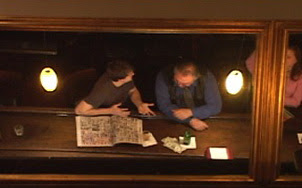"Let not make this more than it is," snaps Israeli cafe owner Sarah to the Palestinian man, Saleem, who delivers her bread and is also fucking the daylights out of her, to their mutual satisfaction, in the new Palestine/ Germany/Netherlands co-production, THE REPORTS ON SARAH AND SALEEM. But what exactly is "this"? It's not Romeo and Juliet by a long shot, and in fact, it's not much more than any other typical sexual dalliance you'd encounter between consenting adulterers.
Ah, location, location, location -- right? And because our adulterers are here, in the Israel/Palestine conundrum, the affair takes on all kinds of unwanted, unpleasant attachments that eventually involve each of the lovers' spouses, their children (one as yet unborn) and the "authorities" who control both locations.
The Palestinian filmmaker, Muayad Alayan (shown at left), working from a screenplay by his brother, Rami Musa Alayan, has concocted a very interesting, mostly engrossing situation (said to be based on fact) in which his two protagonists are neither very intelligent nor even particularly likable. In fact, the character we end up most rooting for is Saleem's wife. (Sarah's husband, a high-level policeman, turns out to be an asshole.)
What happens here, what the authorities "make" of the situation, and how this affects not only the title characters -- Saleem played by Adeeb Safadi, above, left, and below; Sarah by Sivane Kretchner, above, right, and at bottom -- but also their families and friends, turns a hot, sexual tryst into something impossibly severe and nasty.
As you might expect, the Israelis possess the lion's share of the power and use it to their own ends, while the the Palestinians do the same, with the lesser amount they have to muster garnering less results. None of it works well for the protagonists and finally begins to dirty those around them, too. (That's Maisa Abd Elhadi, below, as Saleen's wife.)
The movie does give new, if actually untrue in this case, meaning to the idea that the personal is political. Well, not unless the powers-that-be want to make it so. Toward the conclusion the ironies grow a little heavy-handed and suddenly things descend into high melodrama and near camp before concluding on a note of feel-good female bonding. I had trouble buying into the latter half of the film, but you might manage it a bit better. On the technical side, all aspects -- from cinematography to set design to editing -- are impressive.
Released by DADA Films, running 127 minutes, in Arabic and Hebrew with English subtitles (a little English is spoken now and again), the movie opens here in South Florida this Friday, July 12: in Miami at the Coral Gables Art Cinema, in Fort Lauderdale at the Classic Gateway 4, in Boca Raton at the Regal Shadowood and Living Room Theatres, and at the Movies of Delray and Movies of Lake Worth. To view all currently scheduled playdates, cities and theaters, click here and scroll down.






































